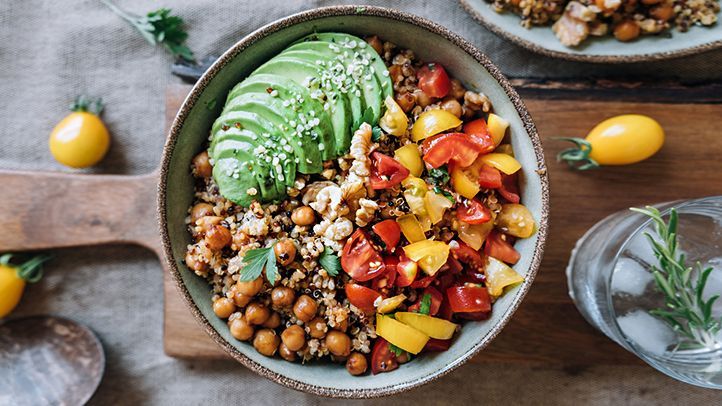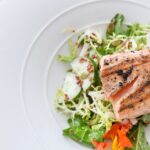A plant-based diet doesn’t have to be complicated. Here are some tips to make the transition as simple (and delicious) as possible.
1. Keep Goals Manageable
Start with small goals, such as adding a serving of fruit with breakfast or filling half your plate with vegetables at dinner, Wagner suggests. You can also try focusing on what you want to add rather than what you want to remove from your diet, adds Zerner.
If you start with an overly restrictive diet it may be harder to make the changes permanent, so it’s a good idea to change your eating habits gradually.
2. Look for ‘Heart Healthy’ on the Menu When Eating Out
Sometimes restaurants feature lower calorie or heart healthy options in a section on their menu, and this tends to include more plant-based foods, says Wagner.
Wagner also suggests reviewing the menu before you go so you can plan your order ahead of time. You might be able to ask for modifications, like replacing chicken with tofu or beans.
3. Think of Meat as a Garnish
An easy way to minimize meat in your overall diet is to think about it not as a main dish, but as a topping.
This might look like loading up a brown rice or quinoa bowl with more veggies and a smaller amount of seasoned meat, or adding smaller amounts of meat to a burrito or salad in comparison with the vegetables or plant-based proteins you’re eating.
4. Consider Food Quality
Not all plant-based diets are created equal, Zerner says. “For example, white pasta with marinara sauce is plant-based, but it’s lacking in enough protein and other key nutrients.”
If you’re eating plant-based for optimal health, ensure that whole, high-fiber, and minimally processed foods make up the bulk of your diet.
5. Supplement Where Necessary
You may need to be intentional when it comes to avoiding deficiencies, especially if you’re forgoing all animal products. You can either take a daily supplement or eat plenty of plant-based foods with higher levels of the nutrients you’re targeting.
For example, some research finds that vitamin B12 deficiency is common among vegans but that daily doses of vitamin B12 ranging from 50 to 100 micrograms (mcg) are sufficient to alleviate deficiency. You can also eat foods fortified with B12, such as cereals or nutritional yeast.
Consult with a registered dietitian for help planning balanced meals that meet your nutritional needs.
Read the full article here




